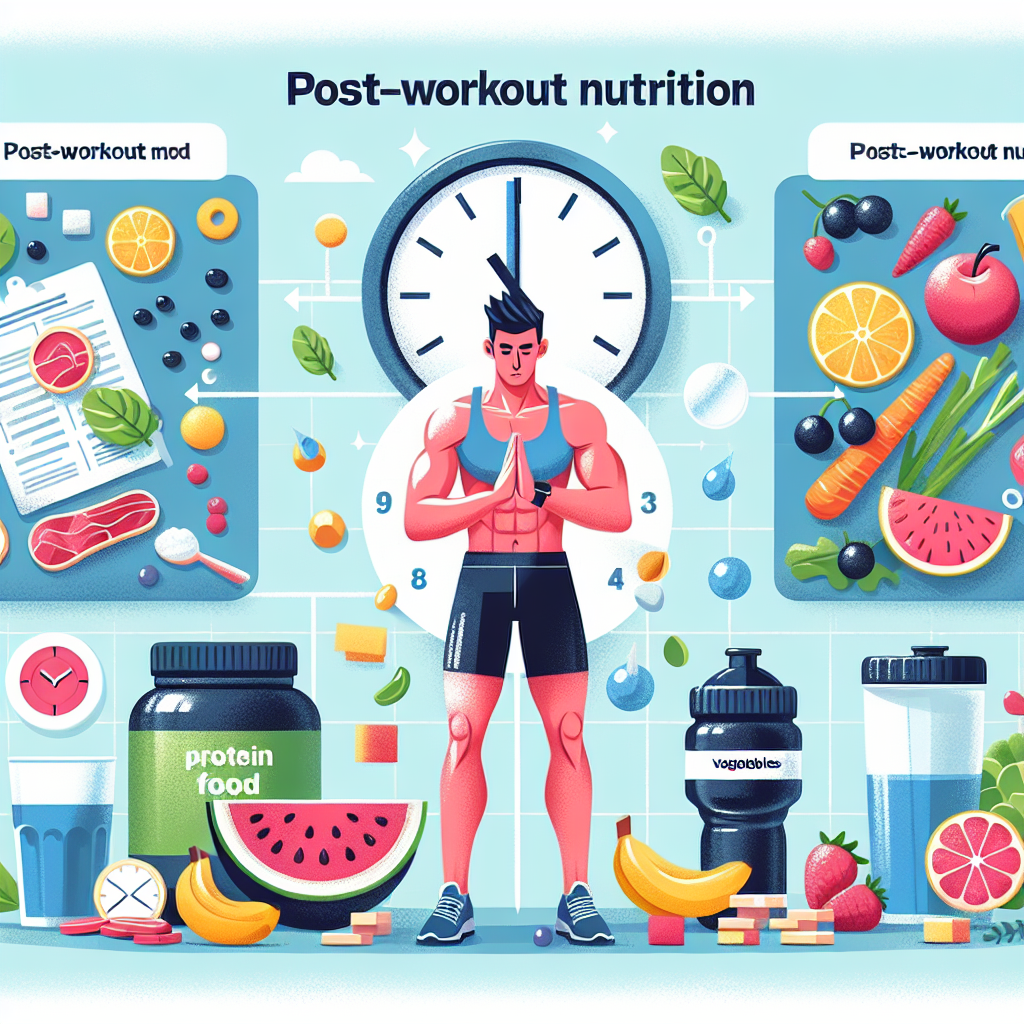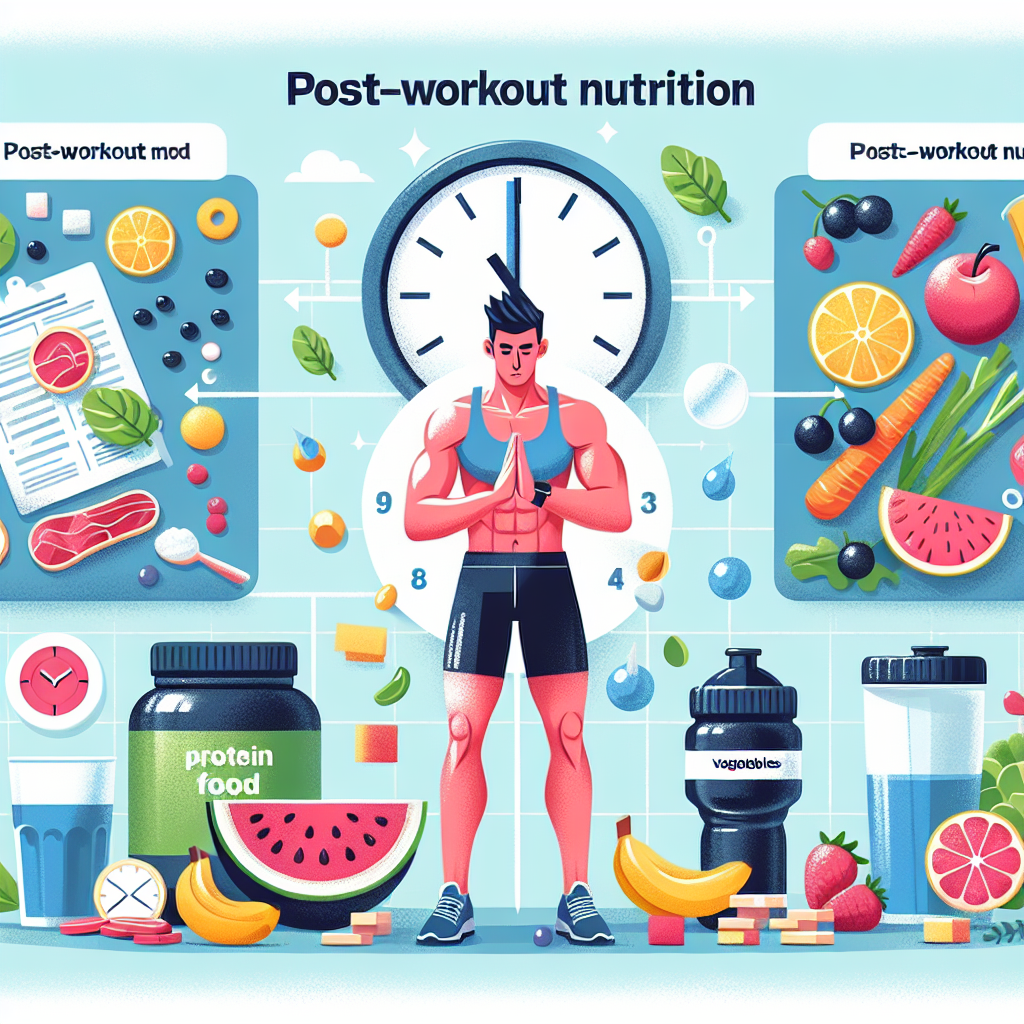Are you looking to optimize your post-workout recovery? Well, look no further because this article is here to guide you through the most effective nutritional strategies for enhanced recovery. Whether you’re a seasoned athlete or just starting your fitness journey, understanding how to properly nourish your body after exercise is essential for faster recovery and improved performance. From protein intake to hydration and nutrient timing, we’ll cover all the bases to ensure you’re equipped with the knowledge and tools to maximize your recovery and get back to the gym feeling stronger and more energized than ever before. So, let’s dive into the world of nutrition and unlock the secrets to a speedy recovery after your workouts!
Macronutrients for Enhanced Recovery
Protein
Protein is an essential macronutrient when it comes to enhancing recovery post-workout. It plays a crucial role in repairing and rebuilding muscles, which can become damaged during intense exercise. Consuming an adequate amount of protein after your workouts can help promote muscle protein synthesis, leading to faster recovery and muscle growth.
Some excellent sources of protein include lean meats like chicken, turkey, and fish, as well as eggs, dairy products, and plant-based sources like tofu and legumes. Aim to consume around 20-30 grams of protein within 30 minutes to an hour after your workout to maximize its benefits.
Carbohydrates
Carbohydrates are another vital macronutrient for enhanced recovery post-workout. They provide your body with the necessary fuel and energy to perform at its best during exercise. Consuming carbohydrates after your workout helps replenish glycogen stores in your muscles and aids in muscle recovery.
Choose complex carbohydrates like whole grains, fruits, and vegetables over simple sugars to ensure a steady release of energy and to provide essential nutrients. Aim to consume 1-1.2 grams of carbohydrates per kilogram of body weight within 30 minutes to two hours after your workout.
Fats
While protein and carbohydrates take the spotlight in post-workout nutrition, fats also play a role in enhanced recovery. Incorporating healthy fats into your post-workout meals can help reduce inflammation, support hormone production, and provide a source of long-lasting energy.
Opt for sources of unsaturated fats such as avocados, nuts, seeds, and olive oil. Including a small amount of fat alongside your protein and carbohydrates can help balance your meal and maximize the absorption of various nutrients.
Micronutrients for Enhanced Recovery
Vitamins
Vitamins are micronutrients that play numerous roles in the body, including supporting immune function and aiding in recovery post-workout. Some key vitamins for enhanced recovery include vitamin C, vitamin E, and the B vitamins.
Fruits and vegetables are excellent sources of vitamins, so be sure to include a variety of colorful produce in your post-workout meals. Additionally, considering a multivitamin supplement can help fill any potential nutrient gaps in your diet.
Minerals
Minerals, such as calcium, magnesium, and zinc, are essential for optimal recovery post-workout. They play a role in muscle contraction, relaxation, and repair. Including mineral-rich foods like dairy products, leafy greens, nuts, and seeds in your post-workout meals can help replenish these nutrients.
Antioxidants
Antioxidants are compounds that help combat oxidative stress and reduce inflammation in the body. Consuming foods rich in antioxidants can potentially aid in faster recovery and reduce muscle soreness post-workout. Some excellent sources of antioxidants include berries, dark leafy greens, and colorful fruits and vegetables. Consider incorporating these foods into your meals to support enhanced recovery.

Hydration for Enhanced Recovery
Importance of Hydration
Staying properly hydrated is vital for enhanced recovery post-workout. During exercise, you lose fluid through sweat, and replenishing those losses is crucial to maintain optimal performance and aid in recovery.
Dehydration can lead to decreased exercise performance, muscle cramps, and fatigue. It’s essential to drink fluids before, during, and after your workouts to stay adequately hydrated.
Water
Water is the simplest and most effective form of hydration. It helps regulate body temperature, transport nutrients, and remove waste from the body. Aim to drink at least 8-10 cups (64-80 ounces) of water per day and increase your intake during and after exercise to replace any fluid lost.
Sports Drinks
Sports drinks can be a beneficial option for enhanced recovery, especially during intense or prolonged exercise sessions. They contain electrolytes and carbohydrates, which help replenish lost fluids and provide energy. However, for most moderate-intensity workouts, water is sufficient for hydration purposes.
Electrolytes
Electrolytes, such as sodium, potassium, and magnesium, play a critical role in fluid balance and muscle function. Replenishing electrolytes lost through sweat can aid in hydration and enhance recovery post-workout.
Consider including electrolyte-rich foods like bananas, coconut water, and pickles in your post-workout meals to support optimal electrolyte levels.
Pre-Workout Nutrition for Enhanced Recovery
Timing of Pre-Workout Meal
The timing of your pre-workout meal is crucial for enhanced recovery. Eating a balanced meal or snack 1-3 hours before your workout ensures that your body has enough fuel to perform at its best and supports proper recovery afterward.
Types of Pre-Workout Foods
When it comes to pre-workout nutrition, focus on consuming a combination of carbohydrates, protein, and a small amount of healthy fats. This combination provides a steady release of energy and supports muscle recovery.
Some suitable pre-workout options include a banana with almond butter, Greek yogurt with berries, or a turkey and avocado sandwich on whole grain bread.
Supplements
Certain supplements can also enhance recovery when consumed before your workouts. Creatine monohydrate, beta-alanine, and caffeine are popular choices that have been shown to increase performance and aid in recovery. However, it’s essential to consult with a healthcare professional or a registered dietitian before incorporating any supplements into your routine.

Post-Workout Nutrition for Enhanced Recovery
Timing of Post-Workout Meal
Just as timing is essential for pre-workout nutrition, the timing of your post-workout meal is crucial for enhanced recovery. Consuming nutrients within 30 minutes to two hours after your workout helps maximize muscle glycogen replenishment and promotes muscle protein synthesis.
Types of Post-Workout Foods
Your post-workout meal should include a combination of protein and carbohydrates. This combination helps repair and rebuild muscles while replenishing energy stores.
Some great options for post-workout meals include grilled chicken with quinoa and vegetables, a protein shake with a banana, or a turkey wrap with whole grain bread and greens.
Protein Intake
To enhance recovery post-workout, it’s important to consume an adequate amount of protein. Aim for 20-30 grams of high-quality protein within 30 minutes to an hour after your workout. This helps stimulate muscle protein synthesis and promotes muscle recovery and growth.
Carbohydrate Intake
Including carbohydrates in your post-workout meal is crucial to replenish glycogen stores and provide energy. Consume 1-1.2 grams of carbohydrates per kilogram of body weight within the first two hours post-workout to support enhanced recovery.
Supplements
Certain supplements can be beneficial for enhanced recovery post-workout. Whey protein powder, creatine, and branched-chain amino acids (BCAAs) are popular choices that can aid in muscle repair and growth. However, it’s important to consult with a healthcare professional or a registered dietitian before starting any supplement regimen.
Meal Timing and Frequency for Enhanced Recovery
Timing of Meals
Spacing your meals throughout the day is important for enhanced recovery. Consuming regular meals and snacks every 3-4 hours ensures a steady supply of nutrients to support muscle repair and replenish energy stores.
Frequency of Meals
To optimize recovery, aim for three main meals and 1-2 snacks per day. This ensures that your body receives a constant supply of nutrients and can enhance recovery post-workout.
Meal Composition
Every meal should include a combination of carbohydrates, proteins, and healthy fats. This helps maintain stable blood sugar levels, provides essential nutrients, and supports enhanced recovery.
Protein Quality and Quantity for Enhanced Recovery
Recommended Protein Intake
To enhance recovery post-workout, it’s important to consume an adequate amount of protein. Aim for 1.2-2.0 grams of protein per kilogram of body weight per day. This ensures that you’re providing your muscles with the necessary amino acids for repair and growth.
Sources of High-Quality Protein
Include high-quality sources of protein in your diet to support enhanced recovery. Lean meats like chicken, turkey, and fish are excellent options, as are eggs, dairy products, and plant-based sources like tofu and legumes. These protein sources provide essential amino acids and support muscle protein synthesis.
Protein Timing
Distributing your protein intake throughout the day, rather than consuming it all in one meal, is beneficial for enhanced recovery. Aim to evenly spread your protein intake across breakfast, lunch, dinner, and snacks to optimize muscle repair and recovery.
Carbohydrate Timing and Type for Enhanced Recovery
Importance of Carbohydrates
Carbohydrates play a significant role in enhanced recovery post-workout. They provide the necessary fuel and energy for exercise, replenish glycogen stores, and support muscle recovery.
Timing of Carbohydrate Intake
Consuming carbohydrates within 30 minutes to two hours after your workout is crucial for enhanced recovery. This window allows for optimal glycogen replenishment and nutrient absorption.
Types of Carbohydrates
Focus on consuming complex carbohydrates after your workout. Whole grains, fruits, and vegetables provide a steady release of energy and important nutrients to support recovery. Avoid excessive consumption of sugary or processed carbohydrates, as they can lead to energy crashes and hinder recovery.
Fat Intake for Enhanced Recovery
Types of Fats
Incorporating healthy fats into your post-workout meals can support enhanced recovery. Opt for sources of unsaturated fats like avocados, nuts, seeds, and olive oil. These fats provide sustained energy and help reduce inflammation in the body.
Recommended Fat Intake
While fat intake varies depending on individual needs and goals, aim to include a small amount of healthy fats in each meal. This helps balance your nutrient intake and supports enhanced recovery post-workout.
Timing of Fat Consumption
Consuming fats alongside protein and carbohydrates in your post-workout meal can aid in nutrient absorption and maximize the benefits of your whole meal. Remember, moderation is key, as fats are high in calories.
Supplements for Enhanced Recovery
Protein Supplements
Protein supplements, such as whey or plant-based protein powders, can be a convenient way to enhance recovery post-workout. They provide a concentrated source of protein and can be easily incorporated into your post-workout meal or consumed as a snack.
Creatine
Creatine is a popular supplement that has been shown to increase strength and muscle mass while promoting enhanced recovery. It works by replenishing ATP stores in the muscles, allowing for improved performance and quicker recovery between sessions.
Branched-Chain Amino Acids (BCAAs)
BCAAs are a group of essential amino acids that have been shown to improve exercise performance and reduce muscle soreness. Consuming BCAAs as a supplement can aid in muscle recovery and promote enhanced recovery post-workout.
Glutamine
Glutamine is an amino acid that plays a crucial role in muscle recovery and immune function. Taking glutamine as a supplement may help reduce muscle soreness, support immune health, and enhance recovery after intense exercise.
Omega-3 Fatty Acids
Omega-3 fatty acids, commonly found in fish oil supplements, have anti-inflammatory properties that can aid in recovery post-workout. They help reduce muscle soreness and inflammation, promoting enhanced recovery.
In conclusion, implementing proper nutrition strategies can significantly enhance recovery post-workout. By focusing on macronutrients like protein, carbohydrates, and fats, as well as incorporating essential micronutrients and staying properly hydrated, you can optimize your body’s ability to repair, rebuild, and grow stronger after exercise. Remember to consult with a healthcare professional or a registered dietitian to tailor these strategies to your individual needs and goals.

